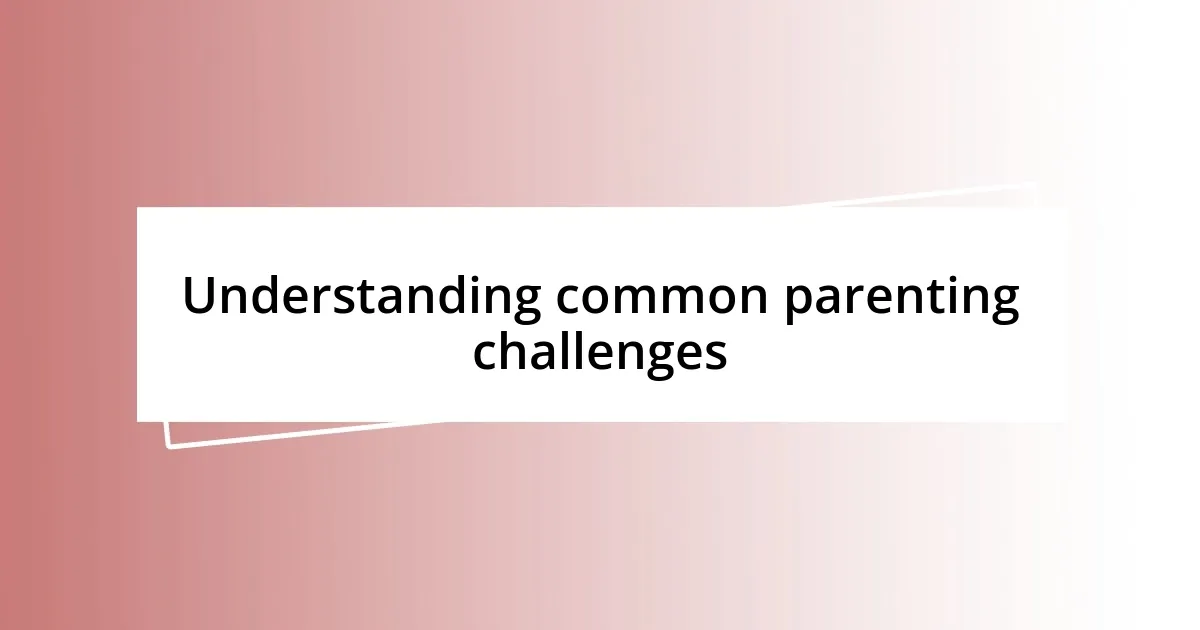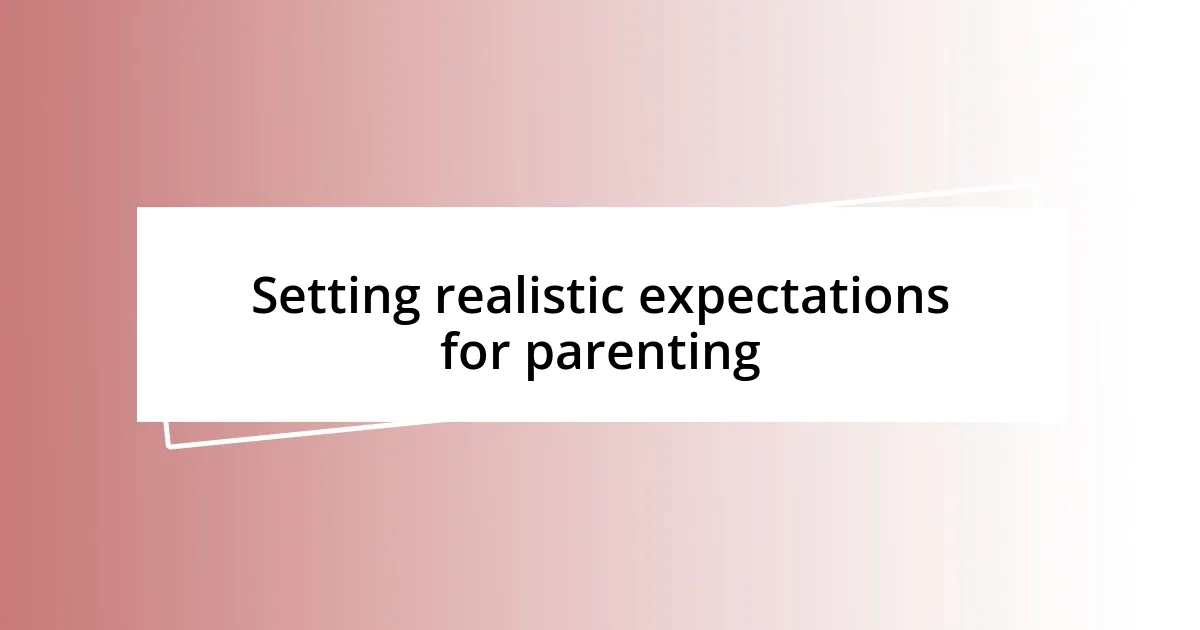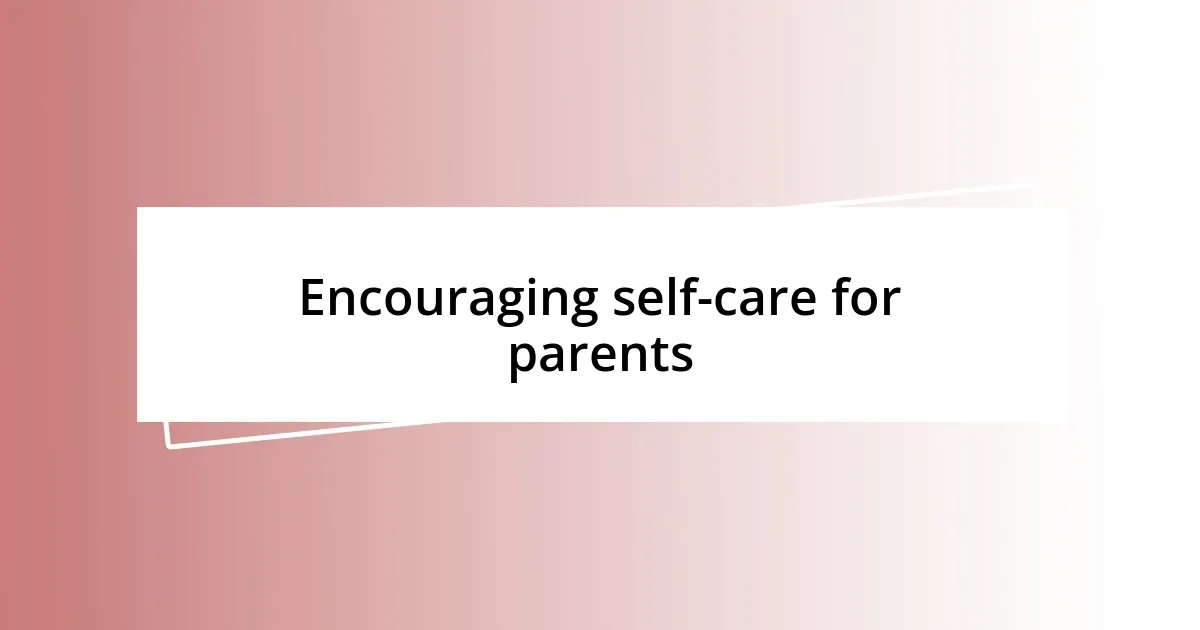Key takeaways:
- Balancing work and family life is a common parenting challenge; it’s important to set realistic expectations and acknowledge limits.
- Effective communication is crucial; listening to children fosters understanding and strengthens relationships.
- Establishing flexible routines can create stability and involve children in the process to encourage responsibility.
- Self-care is essential for parents; taking time for oneself helps maintain well-being and enhances parenting abilities.

Understanding common parenting challenges
Parenting challenges often take different forms, from sleepless nights with a crying infant to the emotional rollercoaster of a teenager. I vividly remember the sleepless nights with my first child; it felt like I was in a fog, navigating through the haze of exhaustion and worry. How do other parents manage these phases while keeping their sanity intact?
One of the most common hurdles is balancing work and family life. I still recall a particular week when deadlines loomed, and my child had the flu. I felt stretched thin, torn between professional responsibilities and the instinct to be a nurturing parent. In these moments, I often ask myself: Is it possible to truly do it all without sacrificing something?
Another frequent challenge involves communication. As kids grow, they develop their own opinions and feelings that sometimes clash with ours. I once found myself in a heated argument with my preteen over a seemingly trivial issue. It struck me then how vital it is to listen and validate their feelings, even when I might disagree. After all, isn’t fostering open dialogue a core part of understanding each other?

Developing effective communication skills
Developing effective communication skills in parenting is essential, as it shapes how we connect with our children. I recall a time when my daughter, frustrated with homework, slammed her book shut and yelled, “You just don’t understand!” Instead of responding with irritation, I took a deep breath and asked her to share what she felt was so overwhelming. That moment transformed our interaction—it was as if a bridge was built between us, allowing her to voice her concerns freely while giving me the insight to support her better.
Listening is one of the cornerstones of effective communication. I often find that my children respond better when they feel heard; a simple nod or “I see” can make all the difference. When my son opens up about his day, I make a conscious effort to put down my phone and engage fully. This practice not only strengthens our bond but also teaches him how to communicate his feelings to others. Isn’t it fascinating how much we can learn from simply being present in the moment?
To illustrate the impact of communication styles, I’ve found it useful to compare different approaches. My friend tends to be direct, while I lean toward being more nurturing. Each of us navigates parenting through our unique lenses, yet both lead to effective outcomes with our kids.
| Communication Style | Description |
|---|---|
| Direct | Clearly stating thoughts, often leading to faster resolutions but may seem harsh. |
| Nurturing | Focusing on emotional tone, encouraging openness but sometimes delaying decisions. |

Setting realistic expectations for parenting
Setting realistic expectations in parenting can be a game-changer. I once believed that I needed to have everything figured out right from the start. But then came the day my toddler threw a massive tantrum in the grocery store, and I realized that perfection was a myth. Instead, it became clear to me that embracing the messiness of parenting was far more rewarding than striving for some unattainable ideal. Allowing myself to be imperfect not only relieved stress but also encouraged my kids to express their emotions freely.
To navigate the everyday reality of parenting, here are a few insights that have guided me:
- Acknowledge your limits: It’s okay to admit that you can’t do it all. Setting boundaries helps reduce overwhelm.
- Focus on the present: I try to remind myself that each day is a new opportunity. Tomorrow is a fresh start to build connections with my kids.
- Celebrate small victories: Whether it’s a successful family dinner or a calm bedtime routine, recognizing these moments boosts morale.
- Learn from mistakes: I often look back on challenging days and ask myself what I could improve. Every mishap is a lesson on this parenting journey.
- Seek support: Connecting with other parents or friends can provide perspective and encouragement. Sharing stories about struggles makes me feel less alone.
By setting these realistic expectations, I find that parenting becomes not just a task but a rewarding adventure.

Establishing routines to manage chaos
Establishing routines has been a lifesaver in my chaotic daily life. When my kids were younger, I struggled to keep track of everything—from school schedules to dinner prep. I soon discovered that by designing a simple morning routine—like having breakfast together and setting specific times for homework—I could create a sense of stability amidst the hustle and bustle. I often ask myself, how much easier could our days be if we always knew what to expect?
Now, don’t get me wrong; routines are not about rigidity; they allow for flexibility within a framework. For instance, the bedtime routine in our household includes quiet reading time, which I cherish. Some nights, my daughter wants to chat about her day instead of diving into her book, and I welcome those moments. This variability keeps our routine from feeling like a chore. Have you ever noticed how a small change can spark deeper conversations?
I’ve also learned to involve my kids in creating these routines. When my son and I mapped out his evening tasks—homework, chores, and choosing a dessert—it empowered him and lessened the resistance. By giving him ownership, I noticed that he takes more responsibility. Isn’t it incredible how a few shared decisions can transform a chaotic situation into a collaborative effort?

Encouraging self-care for parents
Fostering self-care as a parent can feel like a daunting task. I remember a time when I was so focused on my children’s needs that I completely neglected my own. It wasn’t until I broke down over a mountain of laundry that I realized I needed to prioritize my well-being. Taking even just fifteen minutes each day for myself—whether it’s enjoying a cup of coffee in silence or squeezing in a quick workout—has become essential in maintaining my sanity and energy levels. Have you ever found yourself struggling to carve out time for yourself?
I’ve discovered that self-care doesn’t always have to be extravagant. Sometimes, it’s the small moments that make the biggest difference. For me, a simple bubble bath or a few pages of a good book in the evening helps me unwind. It’s in these moments of quiet where I can recharge and reflect on my day. I often remind myself that when I take care of myself, I’m not just benefiting me; I’m nurturing my ability to be a more patient and present parent. Isn’t it interesting how self-care can circle back to positively impact our parenting?
Encouraging self-care among parents also means finding a way to communicate its importance within our family dynamics. I’ve started sharing with my kids why my “me time” matters. Whether it’s explaining why I love my yoga session or live for my reading breaks, I involve them in the conversation. This not only normalizes the need for self-care but also teaches them that it’s okay to take breaks. Have you noticed how a little conversation about self-care can foster understanding and empathy in your kids?














